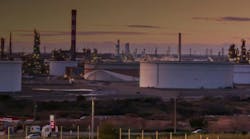A flurry of joint-venture deals is changing the landscape of petrochemical sectors in Europe and the US.
The European Commission (EC) cleared a proposed JV between Spain's Repsol-YPF SA group subsidiary Repsol Química SA and Danish thermoplastics and petrochemicals feedstock company Borealis AS.
Meanwhile, BP and Belgian company Solvay SA signed a preliminary deal to form two polymer JV, and swap other polymer-related assets.
Repsol-YPF, Borealis JV
EC said the 50-50 Repsol-YPF-Borealis JV, which will bring together the two companies' polyolefins businesses and related assets on the Iberian Peninsula, "does not raise any competition concerns."
Borealis is jointly owned by the Norway's Statoil AS, Austrian oil and gas company OMV AG, and the International Petroleum Investment Co. of Abu Dhabi.
"The deal does not give rise to any competition concerns in the markets for olefins and polyolefins, as the combined market shares are modest. Furthermore, there are a significant number of strong competitors," EC said in a statement.
BP, Solvay deals
The deals between BP and Solvay involves businesses with combined turnovers of $2.62 billion. Financial terms were not disclosed.
In Europe, the companies plan to combine their high-density polyethylene (HDPE) businesses into a 50-50 JV. Solvay will also transfer its polypropylene business to BP.
In the US, Solvay and BP will create a 51-49 JV for Solvay's HDPE business, and Solvay will also transfer its US polypropylene business to BP. BP will transfer its engineering polymers business to Solvay.
The proposed transaction is subject to final agreement between the companies, agreement with workers' representatives, and regulatory approval. BP and Solvay expect completion of the proposed deal in midyear.
BP said the addition of Solvay's 800,000 tonne/year polypropylene position in the US and Europe will give it the world's second largest portfolio of polypropylene assets-3.1 million tonnes/year.
The two HDPE JVs will give BP and Solvay 2.2 million tonnes/year of production capacity.
"This agreement is an important step in our petrochemicals portfolio repositioning," said Byron Grote, chief executive of BP's chemicals business. "It creates an industry-leading joint venture in HDPE in Europe, allows [BP] to enter the US HDPE business as an integrated producer of ethylene, gives BP an equity position in the US HDPE market to support the growth of our olefins business, and accesses significant efficiencies from merging Solvay's polypropylene assets into our own. Our disposal of the engineering polymers business is consistent with our focusing the BP portfolio into a limited set of distinctive global positions."

